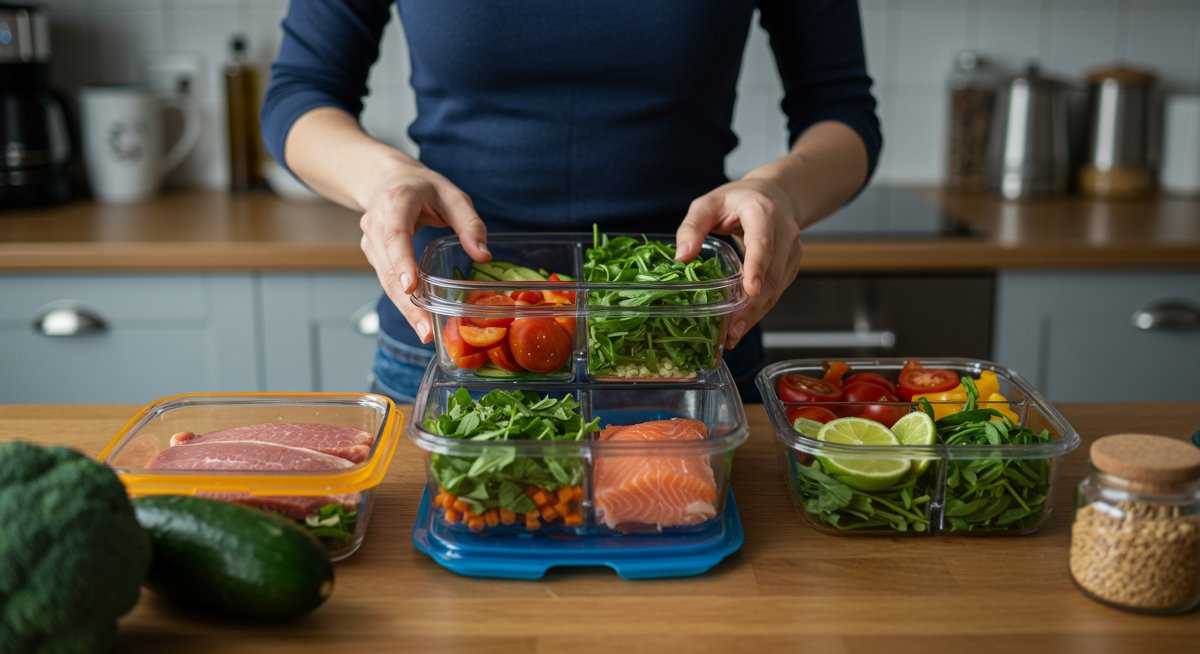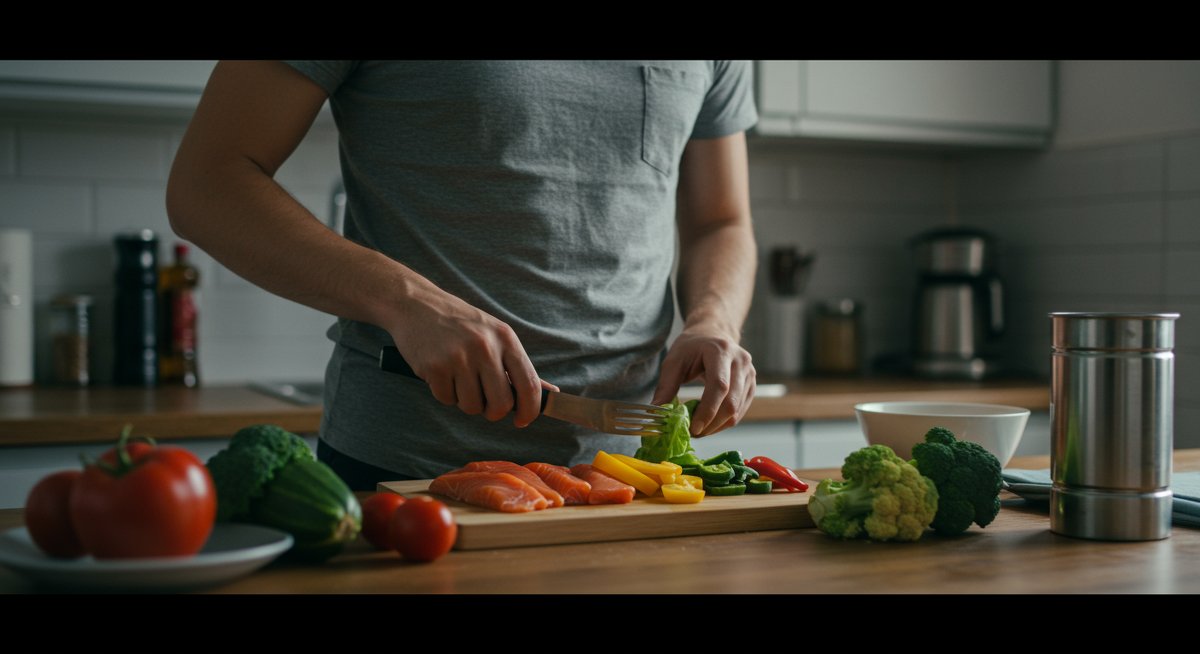Why This Reddit Post Hit Home
So, I was scrolling through r/nutrition the other day and saw a post titled “eating healthy is harder than i thought.” It immediately caught my eye because, honestly, who hasn’t been there? The person basically said they were trying to eat better but were running into all the classic roadblocks: veggies spoiling, healthy food costing a fortune, and those darn cravings hitting hard at night. 62 upvotes and almost 80 comments showed that this was a sentiment shared by many.
It's easy to get caught up in the idea that healthy eating means complicated recipes, exotic ingredients, and a complete lifestyle overhaul. The truth is, it doesn’t have to be that way. Small, sustainable changes are far more effective than drastic measures. What this person described is a common situation, and it really highlights the need for practical, realistic advice. People want to improve their diets, but they don’t want to spend hours in the kitchen or empty their wallets. They just want simple meals and snacks that actually taste good and help them feel better. And that’s totally achievable.
This isn’t about perfection. It’s about progress. It’s about finding ways to incorporate healthier choices into your everyday life without feeling deprived or overwhelmed. It's about building habits that you can maintain long-term. Forget the Instagram-worthy smoothie bowls and the meticulously portioned meal prep containers (unless you're into that, of course). We're talking about real food for real people with real lives.

The Real Struggles of Starting a Healthy Diet
The Reddit post perfectly encapsulates the three main challenges most people face when trying to eat healthier. First, there's the perishability factor. Fresh produce is amazing, but it requires planning and a willingness to eat it before it goes bad. Nobody wants to throw away half a bag of spinach that turned into a slimy mess in the back of the fridge. Then there's the cost. It’s a common misconception that healthy eating is inherently more expensive. While some specialty items can be pricey, many affordable and nutritious options are available.
Finally, there are the cravings. Those late-night urges for chips, cookies, or whatever your favorite comfort food might be, can feel impossible to resist. Restricting yourself completely often backfires, leading to even stronger cravings and potential binges. It’s about finding healthy ways to satisfy those cravings without derailing your progress. It's about moderation and balance, not deprivation.
It's easy to get discouraged when you face these hurdles. You start out with the best intentions, only to find yourself battling spoiled produce, a tight budget, and overwhelming cravings. But don't give up! Recognize that these are normal challenges, and with a few simple strategies, you can overcome them and make healthy eating a sustainable part of your life.
What This Means for YOUR Plate
So, what does all this mean for you? If you're nodding along, thinking, "Yep, that's me!", then you're in the right place. It means it's time to ditch the unrealistic expectations and focus on building a foundation of simple, healthy habits. It means finding meals and snacks that fit into your busy schedule, won't break the bank, and actually taste good.
If you’re short on time, focus on quick and easy meals that require minimal prep. Think stir-fries with pre-cut veggies, one-pan chicken and roasted vegetables, or hearty salads with canned beans or tuna. If you’re on a budget, prioritize affordable staples like eggs, beans, lentils, oats, and frozen fruits and vegetables. These are all incredibly nutritious and versatile. To tackle those cravings, experiment with healthier alternatives to your favorite treats. Try air-popped popcorn instead of chips, a piece of dark chocolate instead of a candy bar, or a smoothie with frozen fruit instead of ice cream.
Don't try to overhaul your entire diet overnight. Instead, pick one or two small changes to focus on each week. Maybe it's adding a serving of vegetables to every meal or swapping sugary drinks for water. Small steps add up over time and create lasting habits. It’s about making progress, not achieving perfection. Every healthy choice you make, no matter how small, is a victory.
The Brutal Reality Nobody Discusses
Let's be real, even with the best intentions and strategies, you're going to have setbacks. You're going to have days when you eat an entire bag of chips, skip your workout, and feel like a failure. It happens to everyone. The key is not to let those setbacks derail you completely.
One of the biggest challenges that people face is the all-or-nothing mindset. They think that if they slip up, they've ruined everything and might as well give up. But that's simply not true. One bad meal or one missed workout doesn't erase all the progress you've made. It's just a small bump in the road. The important thing is to get back on track with your next meal or your next workout.
Another reality that people often overlook is the importance of consistency. You can't expect to see results if you only eat healthy a few days a week or if you only work out sporadically. It's about making healthy habits a consistent part of your lifestyle. That doesn't mean you have to be perfect every single day, but it does mean that you need to be committed to making healthy choices most of the time.
Making This Work With a Hectic Schedule
Life gets busy, and sometimes healthy eating falls by the wayside. Work deadlines, family obligations, social events – they can all throw a wrench into your best-laid plans. But that doesn't mean you have to abandon your healthy habits completely. It just means you need to be flexible and adapt your strategies to fit your current circumstances.
If you're short on time, focus on convenience. Keep healthy snacks readily available, like pre-cut veggies, fruits, nuts, or yogurt. Opt for quick and easy meals that require minimal prep, like salads, sandwiches, or leftovers. If you're traveling, pack healthy snacks and plan your meals in advance. Look for restaurants with healthy options or consider cooking your own meals if you have access to a kitchen.
Don't be afraid to ask for help. If you're struggling to find the time or energy to cook healthy meals, consider enlisting the help of a family member or friend. You could also explore meal delivery services or pre-made meal options at your local grocery store. The goal is to find strategies that work for you and your lifestyle. It's about making healthy eating as easy and convenient as possible, even when life gets crazy.

Actually Putting This Into Practice: A Step-by-Step Guide
Okay, so how do you actually put all this into practice? Here’s a step-by-step guide to help you get started:
- Start Small: Don’t try to change everything at once. Pick one or two small changes to focus on each week. For example, you could commit to drinking more water or adding a serving of vegetables to every meal.
- Plan Ahead: Take some time each week to plan your meals and snacks. This will help you stay on track and avoid impulsive unhealthy choices.
- Stock Up: Make sure you have plenty of healthy options readily available. Keep your pantry and fridge stocked with fruits, vegetables, nuts, seeds, and other healthy staples.
- Prep in Advance: If you have time, prep some of your meals and snacks in advance. Chop vegetables, cook grains, or portion out snacks into individual containers.
- Find Healthy Swaps: Identify your favorite unhealthy foods and find healthier alternatives. For example, swap sugary soda for sparkling water with a squeeze of lemon or lime.
- Don’t Deprive Yourself: Allow yourself occasional treats in moderation. Depriving yourself completely will only lead to cravings and potential binges.
- Be Patient: It takes time to develop new habits. Don’t get discouraged if you slip up occasionally. Just get back on track with your next meal or snack.
My Personal Take on This
Here’s what I think… This whole healthy eating thing doesn't have to be a miserable, restrictive diet. It should be something that nourishes your body, makes you feel good, and fits seamlessly into your life. Focus on adding healthy foods to your diet rather than restricting unhealthy ones. Experiment with different recipes and flavors until you find things you genuinely enjoy eating.
Listen to your body. Pay attention to how different foods make you feel. If something doesn't agree with you, don't force yourself to eat it. And remember, it's okay to indulge in your favorite treats occasionally. Life is too short to deprive yourself completely. The key is moderation and balance. Find what works for you. What matters most is finding a sustainable approach to healthy eating that you can maintain long-term. And remember, it's okay to ask for help along the way. There are tons of resources available to support you on your journey, from registered dietitians to online communities. You're not alone in this!